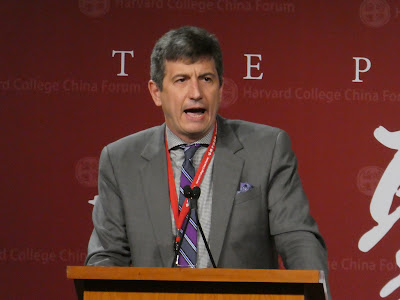轉載
SAVE 2020 CENSUS – “STAND UP AND BE COUNTED”
ADVOCATES URGE
BY MARK HEDIN, ETHNIC MEDIA SERVICES
Mark Hedin is a reporter with the San Francisco
Study Center
The best
response to White House efforts to disenfranchise ethnic communities is for
them to stand up and be counted in the upcoming 2020 census, a wide
spectrum of experts and civil rights advocates
agrees.
It’s a simple strategy to counteract myriad
steps the Trump administration has taken to subvert an accurate count of
everybody in the country – a count mandated by the constitution every 10 years
through the decennial census.
“This is one of the most significant civil
rights issues facing us today,” said Vanita Gupta, president and CEO of the
Leadership Conference on Civil and Human Rights in a media telebriefing on
April 5 hosted by major civil rights groups.
Data from the decennial count determine
everything from how many congressional representatives a state gets to how much
money the government allocates for schools, hospitals and transportation needs
– and much more.
“Communities of color are at risk of being
undercounted and left behind,” Gupta said. “The stakes are too high to remain
on the sidelines.”
Cuts in funding have already disrupted efforts
to improve the accuracy of the data collection.
As things stand now, Gupta said, the agency will face a shortfall of
$933.5 million from what it needs to keep 2020 preparations on track.
Amplifying concerns, on March 26 Commerce Secretary Wilbur Ross announced the
addition of a new question about respondent’s citizenship status, despite
opposition from six former Census Bureau officials, two former Commerce
Secretaries and experts in the field.
The timing of Ross’ proposed question is
unprecedented. It comes too late to allow the Census Bureau to conduct the
careful testing it typically performs prior to making such significant changes.
“We know that adding this question on
citizenship status will cause participation in the census to plummet,” Gupta
said. She called the decision “deeply
flawed…a failure of leadership and a capitulation to President Trump’s nativist
agenda.”
“This is a tactic to scare people away from
participation in the census,” said Arturo Vargas, executive director of NALEO,
the National Association of Latino Elected and Appointed Officials Education
Fund. “The purpose is very clear: the
administration does not want Latinos to be counted.”
Vargas noted that Latinos, at almost 58 million,
are the nation’s second largest population group – almost 18 percent of the
total population.
“Already
we had expressed our concerns about what an online census would mean to the
ability of all people to be counted,” he said, referring to the 2020 census’
reliance on digital participation. Most
at risk for an undercount are very young children. In 2010, an estimated 1 million very young
children went uncounted, of whom 400,000
were Latino.
Marc Morial, president and CEO of the National
Urban League, called the changes “a thinly veiled, back-door effort to
suppress” the representation of non-white Americans in official
consideration. “The prospect of an epic
undercount of African Americans and all people of color in the 2020 Census is
becoming more of a reality each day.”
The African American community has always been
undercounted, Morial noted, starting with the 1790 Census when slaves were
considered three-fifths of a person. In
2010, African Americans were undercounted by more than 2 percent, and African
American children by 6.5 percent. By
contrast, whites were overcounted – by 1 percent in 2000 and again by 1 percent
in 2010.
Morial also noted that last month’s decision to
continue what he called a “prison based gerrymandering” policy – counting
prisoners where they are incarcerated rather than where they come from – will
further ensure a geographic miscount.
“I have no doubt that had it been left to Census
Bureau professionals, that decision would have been reversed. But when the
administration came in, politics prevailed.”
John Yang, president and executive director of
Asian Americans Advancing Justice, pointed out that decisions to cut the number
of census workers and offices by 50 percent will undermine outreach to the very
communities the census has struggled to reach in the past, and trim the
followup efforts to reach those who don’t respond to the initial survey.
Asian Americans were identified by the 2010
census as the fastest growing ethnic group in the nation, increasing by 46
percent since 2000, Yang said. Some 80
percent of Asian Americans either immigrants or children of immigrants, putting
them at high risk for an undercount.
Pointing to widespread fears among immigrant
communities of exposing vulnerable family information, Yang emphasized that the
Census bureau has the most stringent confidentiality rules of any government
agency. Even that, he warned, may not be
enough to ensure participation in today’s charged political climate. Responding
to a reporter’s question, he agreed that the confidentiality protocols were
adopted following revelations that the census during World War II helped
identify Japanese Americans for internment.
“How do we explain that the best way to fight
back, the best way to have a voice in policy discourse, is to be counted,”
NALEO’s Vargas challenged. Noting that
“there is a great amount of fear in Latino communities and in immigrant
communities across the country,” Vargas said the advocates’ task now is to turn
that fear into empowerment. “We will
not cower in fear and not be counted…we will be the ones to defend American
democracy.”
“The fight to save the census is not over, by
any stretch,” Gupta said. She cited lawsuits already filed by the state of
California against Ross’ proposed citizenship question, another by a group of
states led by New York, and efforts by the Conference of for oversight hearings
followed by legislation in Congress.
“Together we can make sure the Census is fully
funded and the decision to add the question on citizenship is overturned,” she
said.














